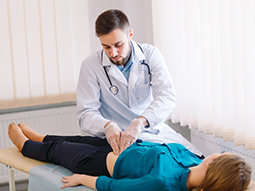Definition and symptoms
Diverticulosis is a common condition in which small areas of the lining of the gastrointestinal tract weaken, causing an out-pouching of the intestine. This out-pouching appears like a small sac. Diverticula are most common in the colon, but can appear anywhere along the gastrointestinal tract. Most individuals do not have any symptoms unless there is a complication.
Risk factors and diagnostics
A combination of genetics and a lower fiber diet are thought to increase the risk of developing diverticulosis. Diverticulosis affects middle- to old-aged men and women equally.
Most cases can be identified through X-ray, CT, and endoscopic examinations.
Treatment
Asymptomatic diverticulosis is not usually treated with anything more than a high fiber diet. However, an infection complicating diverticulosis is called diverticulitis. This occurs when one or more sacs become inflamed with bacterial infection. Symptoms of diverticulitis include fever, abdominal pain, alteration in bowel habits, and appetite changes. This needs to be treated promptly with antibiotics and hospitalization. Further complications of diverticulitis include bowel perforation, bleeding, abscess, or strictures. Surgery may be required in severe cases.
Our providers

Expert gastroenterology care
Getting the care you need starts with seeing one of our gastroenterologists.









